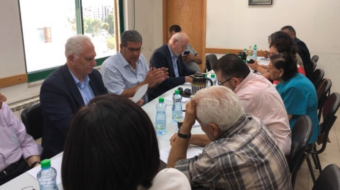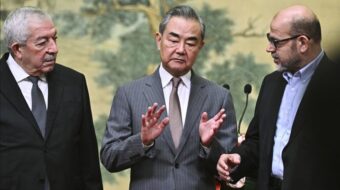
Peace forces to Congress: ‘Now is the time to stand up’
Search and cleanup efforts continued in Kansas after a catastrophic tornado destroyed the town of Greensburg May 4. But another storm was brewing: outrage over the inability of the state’s National Guard to respond quickly.
For Gov. Kathleen Sebelius, it was a nightmare come true. “I have said for nearly two years, and will continue to say, that we have a looming crisis on our hands when it comes to National Guard equipment in Iraq and our needs here at home,” she told The New York Times three days after the tornado struck.
At press time the death toll in Greensburg stood at 10. Flooding elsewhere in Kansas May 6 and 7 further strained rescue forces.
Sebelius said recovery would be hampered because much of the National Guard’s equipment is in Iraq. The Kansas Guard said it had about 40 percent of the equipment it needed. Some 850 state Guard troops are in Iraq or Afghanistan.
“We’re getting pounded in Kansas,” the governor said. “We have the need for National Guard in two different parts of our state now. This is really going to be a problem.”
Antiwar activists in the state shared her concerns.
“We’ve been trying to inform people about the huge costs of the war, year after year,” Ira Harritt of the Kansas City Iraq Task Force said in a telephone interview. “We expect people will see there are many ramifications, including that we can’t respond quickly to disasters.”
Harritt’s views were shared by Horace Santry of the Peace and Social Justice Center of South Central Kansas, in Wichita, 110 miles from Greensburg. “We’re waging a huge war that has little direct impact on most people,” said Santry. With the National Guard situation, he said, “we are starting to connect the war with the human crisis here at home.”
Harritt said Kansas peace forces are “urging members of Congress to do what it takes to make a change, and working to mobilize public opinion so Congress will know it’s time to take stronger action to end this failed policy.” He added, “Our representatives must reframe the debate — not just ‘cut and run,’ but what’s best for the U.S. and Iraqi people.”
Close to 50 soldiers from Kansas have died in Iraq or Afghanistan.
Wichita activists are stepping up protests at the office of Republican Rep. Todd Tiahrt. “People ask me what’s the point of street protests,” said Santry. “But it was street protests that gave Congressman Murtha the courage to stand up and declare his opposition to the war.”
Anne Cowan of the Manhattan (Kansas) Alliance for Peace and Justice, said Democrats need to stay strong and united, and need to be “very careful” about compromises. “I’d like to see timelines in a new bill,” she said, adding that “benchmarks” may play a role, too. “There’s a timeline built in right now: September,” she said. That is when top Iraq commander Gen. David Petraeus is to report to Congress on the military’s effectiveness in Iraq.
As the House readied new legislation following President Bush’s veto of a supplemental funding bill with a troop withdrawal timeline, peace advocates stressed the need for steps to end the war.
With over 60 percent of the country backing Democrats’ proposals to bring troops home and even congressional Republicans starting to waver, MoveOn Political Action told its 3.2 million members, “The voters elected Democrats to power to end the war. Now is the time for them to stand up and fight the president for real accountability on the war.”
MoveOn also warned of the dangers to “the unity Democrats have enjoyed and Democratic leadership has so expertly built” if they pass a bill without measures to end the war.
Some 20 organizations, including Peace Action, Military Families Speak Out, Friends Committee on National Legislation and United for Peace and Justice, urged Senate Majority Leader Harry Reid and House Speaker Nancy Pelosi to send Bush a bill funding only the “safe, orderly and complete withdrawal of all U.S. troops, contractors and bases within six months.”
At press time the House was preparing to vote on a measure to provide funds through midsummer. Further funding through Sept. 30 would require a second vote after Bush submits a series of reports on progress in Iraq.
Meanwhile, in a letter, the heads of the congressional Progressive and Out of Iraq caucuses, California Democrats Lynn Woolsey, Barbara Lee and Maxine Waters, congratulated House Speaker Nancy Pelosi “on your skillful leadership and guidance” of the vetoed appropriations bill and said though they differed on the measure, they look forward to working on renewed efforts to end the war.
They proposed amendments to the upcoming 2008 Defense Authorization Bill, including “complete, holistic change in U.S. policy” toward Iraq, repealing Bush’s war-making authority there and cutting off funds except to withdraw all troops and contractors, while stepping up diplomatic initiatives in the area.
Cracks continued to grow in Republican ranks. House Republican leader John Boehner said that by September or October, “members are going to want to know how well this is working, and if it isn’t, what’s Plan B?” Senate Minority Leader Mitch McConnell (R-Ky.) was exploring attaching political benchmarks for the Iraqi government.
mbechtel @pww.org











Comments